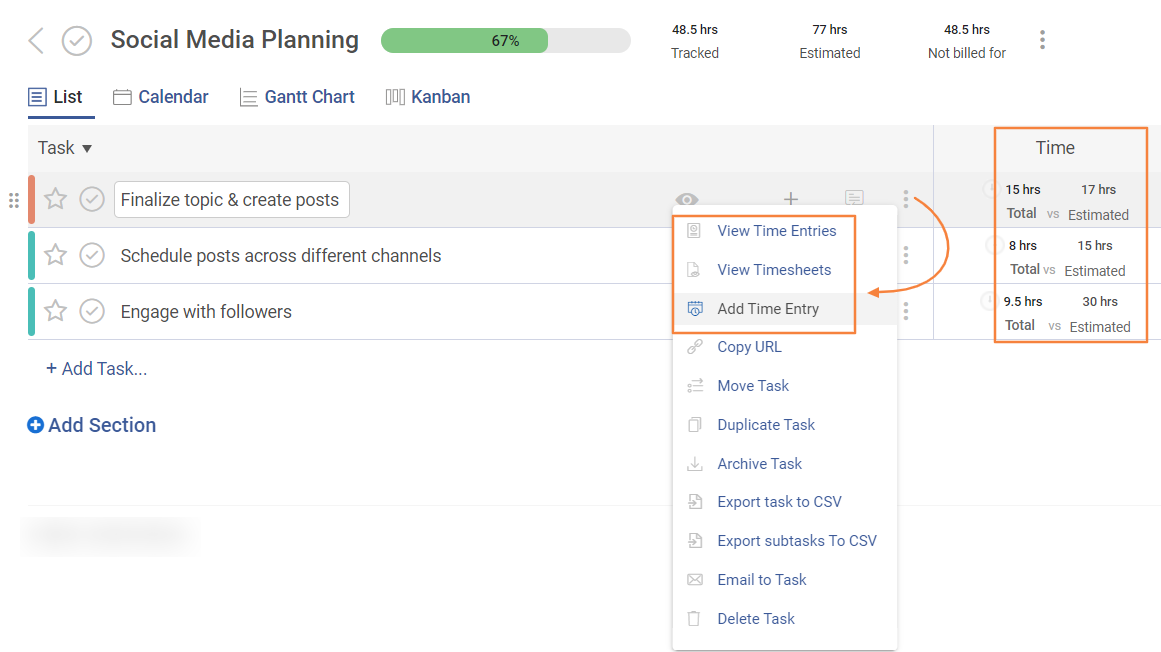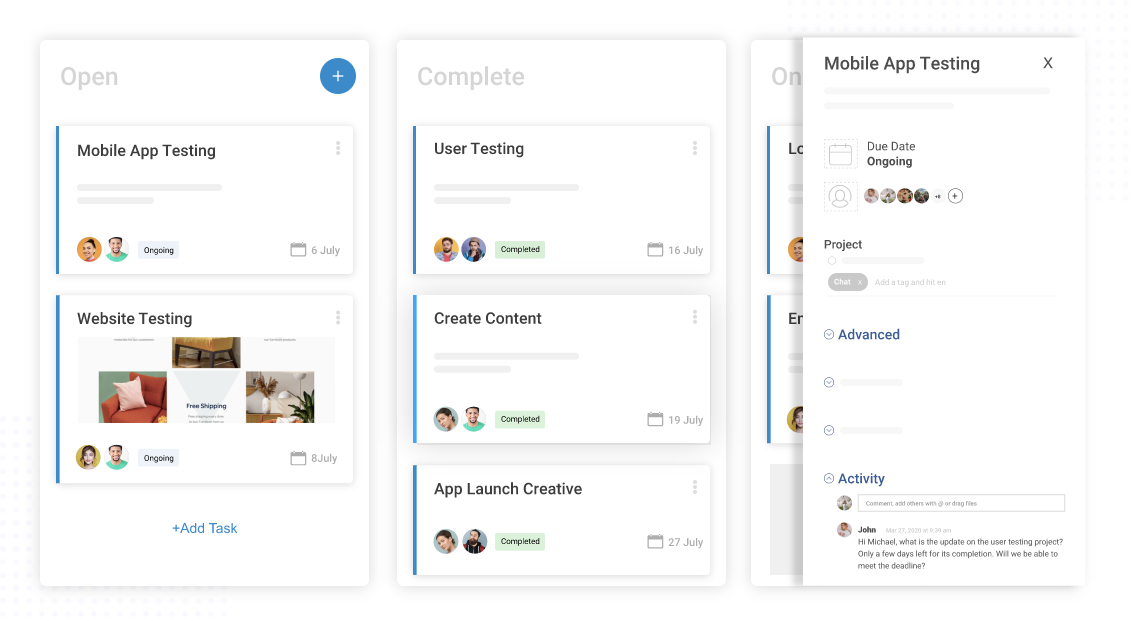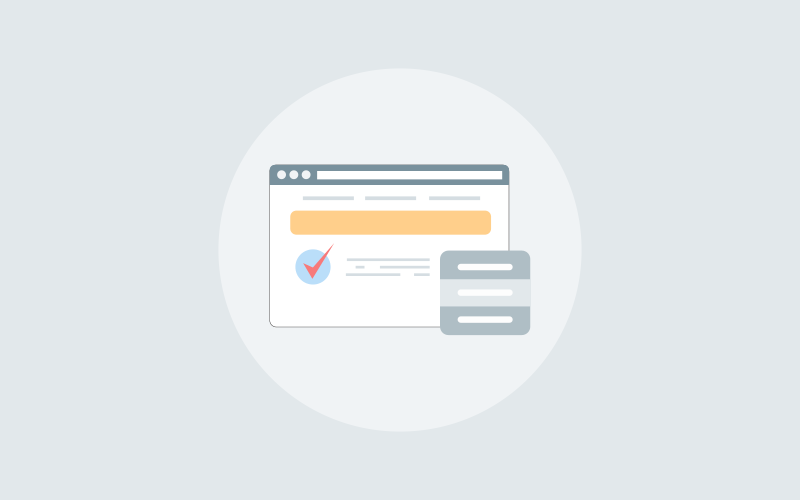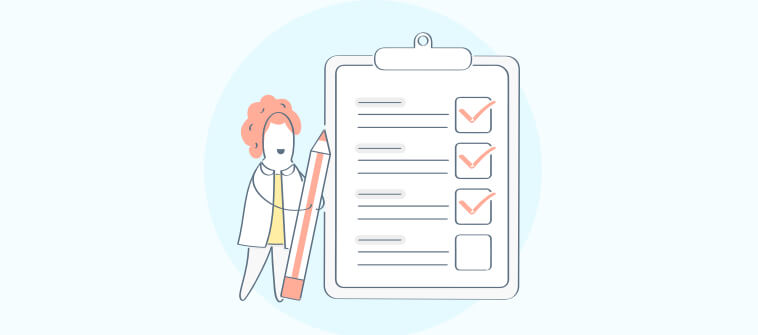What does task management mean to you?
Is it about keeping your daily tasks in check and organized? Or is it delegating tasks to team members more effectively?
If you ask me, “What is task management?” my answer would be a mix of both.
In this blog, I will share all the insights I have gathered by working closely with various project managers over the years. I’ll also recommend my top task management software choices and list the steps to help you choose the most effective software for your business.
What Is Task Management?
Techopedia defines task management as – “an activity in which an individual or team leader tracks a task throughout its life cycle and makes decisions based on progress.”
Simply put, task management is the process of planning, organizing, executing, and monitoring tasks to achieve a specific goal or outcome.
| Tasks are the basic units of work that need to be completed in a project. They can vary in size, complexity, duration, and priority, depending on the project objective. |
Task management involves delegating, prioritizing, tracking, and completing tasks in projects. With the help of a task management tool, this whole thing becomes rather simple. Here’s how it works:
What is Project Management? Learn How to Start Managing Projects Online
Read More: A Complete Guide to Enterprise Project Management in 2024
5 Key Components of Task Management
Following are the key components that comprise the foundation of a well-structured and organized approach to managing tasks.
#1 Setting Clear Objectives
This involves defining specific, measurable, attainable, relevant, and time-bound (SMART) goals.
For instance, a marketing team may set an objective to increase website traffic by 30% in three months through targeted content strategies.
Clear objectives provide direction, a sense of purpose, and a means to measure progress effectively. To make objectives more effective, consider using categories or labels to group similar tasks together. This can make it easier to tackle related tasks.
#2 Prioritization
Once you set your objectives, the next step is prioritizing tasks. Not all tasks are equal – some are more urgent or important than others. By assigning priority levels to tasks, you can focus your time and energy on the most critical ones first.
One popular approach to prioritization is using the “Eisenhower Matrix.”
(Image Source: LinkedIn)
It categorizes tasks into four quadrants:
- Urgent and important
- Important but not urgent
- Urgent but not important
- Neither urgent nor important
This matrix helps you determine which tasks require immediate attention and which can be deferred.
Read More: 9 Emerging Project Management Trends in 2024
#3 Assignment
Task management often involves working as part of a team or collaborating with others. In such cases, it is crucial to assign tasks to the appropriate team members based on their skills, expertise, and availability. Effective delegation ensures that the workload is distributed evenly.
When assigning tasks, provide clear expectations to ensure everyone understands their responsibilities.
One way how this is possible is by using a Personal task management tools like ProProfs Project. There, you can assign tasks to team members easily, manage available resources, and communicate and collaborate with others using @ mentions, tags, task comments, etc.
You can also set dependencies between tasks. Overall, it’s good to have a reliable tool to help you in the process.
#4 Time Management
It includes timelines established for each task, with clear start and end dates. It includes creating a project timeline, estimating the duration of tasks, and ensuring that they fit within the overall project deadline. Effective time management is crucial to avoid delays and ensure timely project completion.

It’s important to allocate time to each task based on its complexity, importance, and deadline. Consider utilizing task management software that comes with time-tracking capabilities. It will help you allocate and manage time effectively.
#5 Monitoring Progress
Task management goes beyond simply creating a to-do list or assigning it to team members. It’s crucial to monitor progress regularly to ensure that you’re on track and making steady progress towards goals.
Utilize visual aids such as charts, graphs, or project reports to track progress.
These visual representations can provide insights into how much work has been completed, what remains to be done, and whether you’re meeting your targets.
Read More: Key Elements & Components Of Project Management
5 Top Benefits of Task Management
Implementing effective task management practices can bring numerous benefits. Here are the 5 most common ones:
#1 Improved Productivity
Did you know that an average employee is productive for only 31% of their 8-hour workday?
Sounds shocking? Well, you can change that.
No, I don’t mean like that. But task management can help!
It is a proven method to boost productivity. By organizing tasks, setting priorities, and creating a clear plan, you can stay focused and accomplish more within a given timeframe. When you know exactly what needs to be done and when, eliminating distractions becomes easier, ultimately leading to increased productivity.
For example, a sales team using task management software can track client interactions and follow-ups systematically, leading to more closed deals and a higher sales volume.
#2 Enhanced Communication
To facilitate effective communication within teams or between individuals, you need a task management tool where you can set clear task assignments and deadlines to ensure the team understands its roles and responsibilities.
I like ProProfs Project’s built-in communication features, such as comments, notifications, and file sharing. It simplifies collaboration, provides transparency, and improves overall communication among team members. It even lets you create teams for different tasks, so you can always know who to turn to when needed.
Read More: 10 Surefire Ways to Improve Team Communication
#3 Reduced Stress
Unorganized and overwhelming workloads can increase stress levels. Task management helps alleviate stress by breaking tasks into smaller, manageable subtasks.

By setting priorities and creating a structured plan, you can avoid feeling overwhelmed and tackle tasks with a clearer mindset. Meeting deadlines becomes more attainable, reducing stress and promoting a healthier work environment.
#4 Improved Time Management
Did you know an average worker spends 51% of their daily work time on low to no-value tasks?
Implementing task management techniques enhances time management skills. Effective task management helps in the optimal allocation of time to various activities.
It involves estimating how long tasks will take and planning accordingly, which helps avoid time crunches and last-minute rushes. By setting realistic deadlines and adhering to them, teams can ensure a more balanced and efficient workflow, leading to timely project completion.
#5 Increased Accountability
Task management promotes accountability by leveraging clear task assignments and deadlines.
With task tracking, progress monitoring, and status updates, team members can hold each other accountable for their contributions. This fosters a sense of responsibility and ensures that tasks are completed efficiently and on time.
Read More: Recurring Task Management: Benefits, How to Create, and More
10 Best Task Management Software Platforms
I spent the last few weeks connecting with market leaders (team leads, project managers, etc.) to know which task management software they have used (or use presently).
Down below is a list that resembles their choices. With a bit of my own research, I’ve also put together what they are best for – so that you can make an informed decision.
| Task Management Tools | Best For | Key Features | Pricing Starts From |
| ProProfs Project | Simplified Task Management | Cloud-based, Real-Time Collaboration, Reports, Workflows, Multiple Views, Time-Tracking | $39.97/month Unlimited users, projects & tasks. 15-day free trial. |
| ClickUp | Generating Detailed Reports | Task Planning, Team Collaboration | $7/member/month |
| Todoist | Creating To-Do Lists | Task Reminders, Sub-tasks, Integrations | $4/month |
| Trello | Workflow Automation | Workflows, Gantt Charts, Recurring Cards | $5/user/month |
| Asana | Strategic Planning | Automation, Templates, Time-Tracking | $10.99/user/month |
| Smartsheet | Real-Time Project Collaboration | Scheduling, Multiple Views, Reporting | $7/user/month |
| Airtable | Building Product Roadmaps | To-Do Lists, Calendar Views, Task Prioritization | $20/seat/month |
| nTask | Online Task Management | Reports, Built-in Timers, Workflows | $3/month |
| Wrike | Workflow Automation | Team Collaboration, Reports, Task Prioritization | $9.80/user/month |
| Basecamp | Remote Work Collaboration | To-Do Lists, Card Table, Reports | $15/user/month |
Best Uses of Task Management Software for Businesses
Task management software can be used for various purposes and functions in businesses, depending on their needs and goals. Some of the common uses are listed below –
Project Planning & Execution
Task management software is instrumental in planning and executing projects. It allows for breaking complex projects into manageable tasks, setting milestones, and tracking progress.
For example, a construction company can use task management software to plan phases of a building project, allocate resources for each phase, and monitor progress against the timeline, ensuring that the project stays on track and within budget.
Such a granular approach to project planning helps outline a clear roadmap, set realistic timelines, and identify potential challenges early in the project lifecycle.
Read More: Project Planning: What Is, Importance, How to Implement, & More
Team Collaboration
Team collaboration features often include task comments, file sharing, task assignment, and notifications. It eliminates silos and ensures that information flows seamlessly across the team. Whether team members are in the same office or spread across different locations, task management software bridges the gap and facilitates effective teamwork.
Resource Management
Task management software provides insights into how resources are being utilized. You can view which team members are overburdened and who can handle some more tasks. This helps balance workloads and ensures that no individual is overwhelmed.

For instance, an IT firm can use task management software to allocate developers, designers, and testers to various projects while also tracking their hours and workload, ensuring that resources are utilized optimally without overburdening anyone.
Read More: 15 Best Resource Management Software & Tools Of 2024
Reporting & Analytics
An often overlooked but critical use of task management software is its reporting and analytics capability. These tools generate reports on various aspects like task completion rates, time spent on tasks, resource utilization, and project progress.
These insights are invaluable for strategic planning and continuous improvement. They help managers understand patterns, identify areas of improvement, and make data-driven decisions.
Agile Methodology
Agile focuses on iterative and incremental development, and task management software lets you break down larger projects into smaller tasks or user stories.
With a task management tool like ProProfs Project, you can create agile boards, such as Kanban boards or Scrum boards, to visualize project progress, track tasks, and manage backlogs. These boards enable teams to better plan work, prioritize tasks, and respond to changes effectively.
Watch: What is a Kanban Board & How It Can Help You Manage Projects Better?
Choosing the Best Task Management Software: 6 Easy Steps
Now that you know about the basics of what is task management software, what are its benefits, components, and use cases, let’s move to the next part. Here, you will read about the top things you need to remember when selecting the best task management software for your company.
- Check User Feedback & Ratings: Obtaining insights directly from users, which include both ratings and feedback from reputable sources, provides a grassroots perspective. This input is crucial in comprehending overall satisfaction levels and potential issues.
- Core Features & Functionality Assessment: A software platform’s worth is determined by its fundamental features and overall functionality. A thorough examination of these aspects allows for a meticulous evaluation of the practical utility and effectiveness of the tool.
- User-Friendliness: The ease of using a product or service should be one of your topmost priorities. Always keep a specific focus on aspects such as design, interface, and navigation.
- Customer Support Quality: The quality of customer support determines what kind of assistance you can expect from the software vendor when there’s a need. Some vendors have adept customer support teams that provide 24×7 assistance throughout different phases – from initial setup to addressing concerns and resolving operational issues.
- Pricing Factor: You need to assess whether the software offers value for your money. This involves comparing quality, performance, and features to ascertain whether your company would receive a worthwhile return on its investment.
- Compatibility: The task management software should be compatible and interoperable with the other tools you use. It should be able to sync with tools such as email, calendar, cloud storage, CRM, etc. It should also work across different devices and platforms, such as web, mobile, desktop, and more.
Looking for an ultimate buyer’s guide? Watch this quick video –
Watch: How to Choose the Best Project Management Software
Ready to Achieve Optimal Productivity?
Proper task management is essential in achieving optimal productivity, efficiency, and success in your business.
This guide highlights what is task management, its key components and benefits, the best software solutions, how businesses can benefit, and the factors to consider when choosing the best software.
Regardless of which task management software you choose, always consider opting for a free trial or demo. For example, ProProfs Project offers a free trial of 15 days, making it easy to test the functionality before you invest in it.
FREE. All Features. FOREVER!
Try our Forever FREE account with all premium features!





